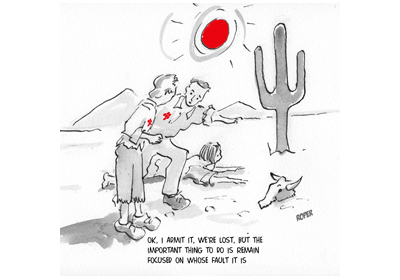It’s rare that a month goes by without yet another high-profile leader being caught in the media spotlight and taking a walk of shame.
These talented leaders were highly successful in their respective fields and at the peak of their careers. This makes their behaviour especially baffling. How do powerful people lose their moral bearings? What went wrong, and how can you learn from it?
Knowing yourself: your path to leadership development
The media and the general public paint these leaders as bad people, even ‘evil’. But simplistic notions of good and bad don’t help; this could happen to any of us. Leaders who lose their way are not necessarily bad people – very few people go into leadership roles to cheat or do evil. Rather, they lose their moral bearings, giving in to temptation – and we all have the capacity to do that!
Before taking on leadership, ask yourself, “Why do I want to lead?” and “What’s the purpose of my leadership?” Finding the real answers to these simple questions may take you years. If your honest answers are “power”, “prestige”, and “money”, you are at risk of relying on external gratification for fulfilment. There’s nothing wrong with wanting these outward symbols however, as long as they are combined with a deeper urge to serve something greater than yourself.
The leadership trap
While I’m sure you value fair compensation for your accomplishments, you’d be unusual if you started out seeking only money, power, and prestige. The danger is that along the way, the rewards – bonuses, newspaper articles, perks, and stock appreciation – might fuel an increasing desire in you for more.
For many people being a successful manager – leading your company from peak to peak, delivering the goods – is intoxicating. Success leads to greater belief in yourself, but can also lead to distortion. When you achieve results you are celebrated, and you begin to believe your own publicity. How can you stay grounded as a leader and avoid taking actions you may come deeply to regret?
The dark side of leadership
When you focus on external gratification over inner satisfaction, you lose your direction. You reject honest critics who tell you the truth in favour of people who tell you what you want to hear. Others learn not to confront you with reality.
In the drive for perfection you may become incapable of acknowledging your failures and blind spots. You can cause your entire organisation to lose touch with reality, and are vulnerable to making big mistakes, such as violating the law or putting your organisation’s existence at risk.
Before the financial crisis of 2007/2008, CEO of Lehman Brothers Richard Fuld refused to recognise that Lehman was undercapitalised. He persistently rejected advice to seek added capital, deluding himself that the federal government would bail him out. When the crisis hit, he had run out of options other than bankruptcy. His denial turned misjudgements into catastrophe for the entire financial system.
It’s lonely at the top, because you are ultimately responsible for people’s lives and fortunes. If you fail, others get hurt. To handle the burdens and loneliness, it’s easier to deny them, to shut down your inner voice, because it is too painful to acknowledge.
Meanwhile, your work and personal lives get out of balance. You lose touch with those closest to you – their spouses, children, and best friends – or co-opt them into your new points of view. Eventually, you lose your capacity to think logically about important issues.
Servant leadership
To stay grounded, prepare yourself to confront complexities and pressures. Leading is high stress work. You cannot avoid the challenge of being responsible for people, your organisation, outcomes, and uncertainties in the environment. As you move up you have greater freedom to control your destiny, but you also experience increased temptation.
Avoid the pitfalls by devoting yourself to personal development that cultivates your ‘inner compass’. Reframe your leadership from being a hero to being the servant of the people you lead. You need to give this some thought and introspection because the chances are you got into your leadership role in response to your ego needs – and your ego won’t like it!. Move from external gratification to internal satisfaction by making a meaningful contribution through your leadership.
Maintain your equilibrium on the journey. Depending on your style, you may practise meditation or yoga to relieve stress, while others find solace in prayer, reading, music, or taking long runs or walks. Your choices don’t matter, as long as they relieve stress and enable you to think clearly about work and personal issues.
Build a structure to support you
The reality is that you cannot stay grounded by yourself. Seek out people who influence you in profound ways and stay connected to them. You need mentors to advise you when facing difficult decisions. Look for tough, reliable mentors who are entirely honest and straight with you.
Surround yourselves with people who will be honest with you about how you really are and what you are becoming, and make them promise not to hold back from telling you the truth.
[callout title=”Avoid the dark side of leadership” button=”Here’s how” link=”/management-skills-training/” buttoncolor=”white, yellow, orange, red, blue, green, gray, black, alternative-1, alternative-2, alternative-3″ target=”_blank or _self”]Discover our powerful leadership programmes[/callout]
